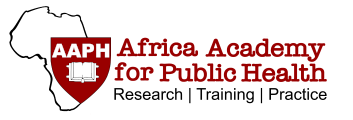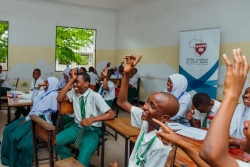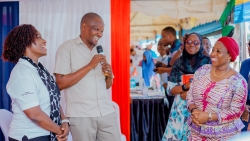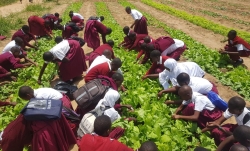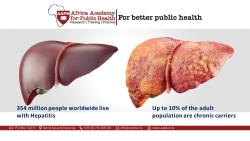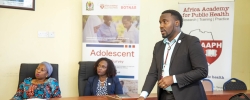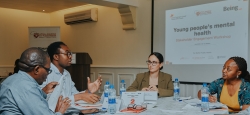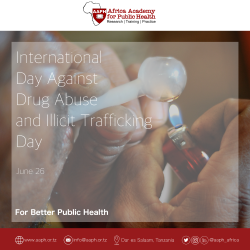In response to increased rates of undernutrition, overweight, and food insecurity among adolescents in low- and middle-income countries (LMICs), the Africa Academy for Public Health (AAPH) in collaboration with the Harvard T.H. Chan School of Public Health, Tanzania's Ministry of Health, the Local Government and beneficiaries are co-designing adolescent-led interventions including digital approaches.
AAPH takes pride in such collaborative efforts to build local capacity via summer research training fellowships, and postgraduate programs with Harvard University and other global partners; developing the next generation of African public health leaders. #ForBetterPublicHealth
As we commemorate suicide prevention day this year, we are all obligated to play our roles in giving rise to hope for others through our actions. We should strive to create a safe environment for young people and everyone else to express their feelings in schools, workplaces, healthcare facilities and communities without judgement, For Better Public Health.
Dr Mary Mwanyika Sando the CEO and her team disseminated key findings from the ARISE Adolescents Health Survey titled “Harnessing longitudinal data and digital technologies to improve adolescent health across sub-Saharan Africa”, which was supported by Fondation Botnar and implemented in collaboration with Tanga City Council.
Green Skills for Youth: Towards a Sustainable WorldThe Meals, Education, and Garden for in school Adolescents (MEGA) Project was implemented among six secondary schools. MEGA had four key components: school gardening; school meals program; and comprehensive education on water, sanitation, and hygiene (WASH), agriculture as well as nutrition. As we respond to the urgent climate crisis and pursue the Sustainable Development Goals, the significance of green skills become undeniable. It is imperative that governments, educational institutions, businesses, and communities unite to embed green skills within educational frameworks and professional training. By doing so, young people shall be equipped with the tools to catalyze innovation, promote sustainable practices, and navigate the future challenges, for Better Public Health.
Viral Hepatitis Day 2023 presents an opportunity to recommit to fighting viral hepatitis and ensuring the well-being of everyone. We can all play a role by spreading awareness, promoting prevention, and access to quality healthcare services. Tanzania and the World can move closer to eliminating viral hepatitis as a public health threat. One life, one liver, for Better Public Health.
Dissemination of ARISE Adolescent Health Survey findings was conducted in Tanga City Council on the 17th July 2023. It was attended by the Minister of Health Hon. Minister Ummy Mwalimu (MP) and members of diverse Tanga City Council (TCC) departments who are key implementers of day-to-day activities involving adolescents in Tanga. During the meeting, key findings on Sexual and Reproductive Health, Mental Health, Health Service Utilization, Water Sanitation and Hygiene, and Substance Use were presented by Africa Academy of Public Health AAPH (convener of the ARISE Network) to the Minister of Health.
AAPH hosts a Young People's Mental Health Stakeholders' Engagement Workshop in Dar es Salaam - Tanzania. The workshop was officiated by Dr. Erasmus Mdeme, Head of Mental Health and Substance Abuse Department, Ministry of Health, and served as a platform to identify gaps and prioritize areas pertaining to the mental health of young people in Tanzania, recognizing the utmost importance of their well-being.
People first: stop stigma and discrimination, strengthen prevention. The importance of early intervention and support for people with drug use disorders cannot be overstated, but stigma and discrimination are major barriers in achieving this. As we aim for a world free of drug abuse, let us strengthen prevention while combating stigma and discrimination against people who use drugs by promoting language and attitude that is respectful and non-judgmental For Better Public Health.
Kwa mujibu wa dhima ya mwaka huu, "Haki za mtoto katika mazingira ya kidigitali", ni muhimu kuelewa kwamba mtandao na teknolojia nyingine za kidigitali huweza kuwa na faida nyingi kwa watoto kama vile kujifunza, burudani na kuongeza ushirika katika jamii. Hata hivyo huweza pia kuleta hatari fulani kama vile uonevu mtandaoni, matapeli wa mtandaoni na habari potofu. Ili kuhakikisha kwamba watoto wanaweza kufurahia faida za ulimwengu wa kidigitali wakiwa wanaepuka hatari. Tukiwa tunasherehekea Siku ya Kimataifa ya Mtoto wa Afrika mwaka huu, ni muhimu kuongeza ufahamu juu ya fursa na changamoto ambazo teknolojia inawezaleta kwenye ustawi, maendeleo na ulinzi wa watoto wetu. For Better Public Health
